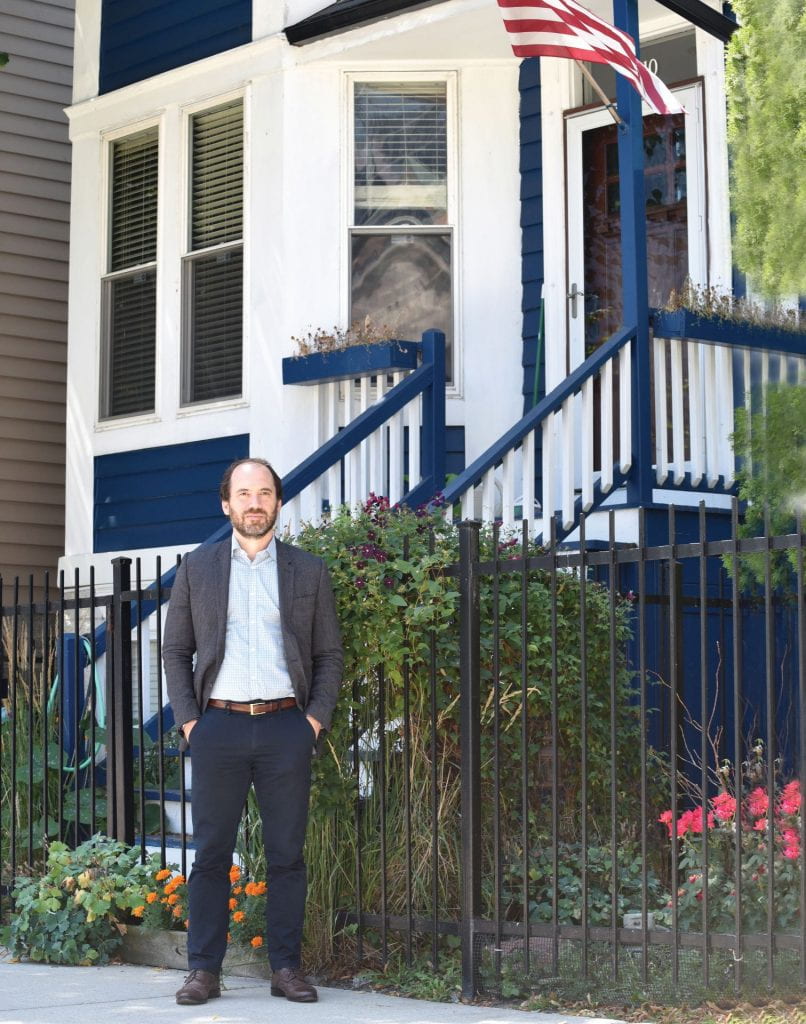 Institute for Housing Studies Executive Director Geoff Smith
Institute for Housing Studies Executive Director Geoff SmithThe
Institute for Housing Studies at DePaul University (IHS) has been awarded a three-year, $300,000 grant from the John D. and Catherine T. MacArthur Foundation to support the IHS’s mission to produce research that informs housing policy and practice in the Chicago region.
“We’re excited to continue our longstanding partnership with the MacArthur Foundation through this latest substantial investment in our applied research and technical assistance work, which sheds light on important issues involving Chicago-area affordable housing and neighborhood housing market trends,” says Geoff Smith, executive director of the IHS. “This funding will advance our efforts to help local housing and community development stakeholders be data-informed as they develop, implement and evaluate strategies for tackling the region’s affordable housing challenges.”
The grant supports the IHS’s ongoing analysis of the state of affordable housing, which includes rental housing reports, price index updates and briefs on emerging Chicago-area housing policy topics. It also will fund new inquiries that will probe “how the COVID-19 economy is affecting Chicago neighborhoods, especially historically underinvested communities, and what an equitable recovery could look like,” Smith says.
MacArthur Foundation funding was critical to the launch of the IHS in 2007 and was part of a $3.5 million grant to create the Preservation Compact, a coalition of organizations dedicated to conserving affordable housing in the Chicago region. This latest grant to support the Institute’s work was awarded under the foundation’s Chicago Commitment focus area.
Institute Helps Shape Data-Driven Solutions to Housing Challenges
Part of the Real Estate Center of DePaul’s Driehaus College of Business, the IHS has a research team that manages an extensive clearinghouse of private and public data on local housing market activity. The team mines the data to produce applied research reports, fact sheets and briefs, as well as academic papers.
The institute shares these resources with government policymakers, nonprofits and community housing organizations through direct technical assistance projects, meetings, conferences, newsletters and its website,
HousingStudies.org. The website also features an interactive
Housing Indicators Data Portal where anyone can sort, view and download indicators of Chicago-area housing market health—such as property sales and mortgage and foreclosure activity—by neighborhood, city and county.
Among the reports shared on the site is the institute’s
most recent study of Chicago housing. It revealed a key challenge facing efforts to preserve affordable housing in the city – the loss of the two-, three- and four-flat residential buildings, which are increasingly being replaced by high-end single family homes. The study found that since 2013, Chicago has lost more than 4,800 2-to-4 unit buildings, representing 11,775 rental and owner-occupied housing units or 4.2% of the city’s stock of parcels and housing units.
“Given concerns that COVID-19 will create ongoing financial and housing market instability, particularly for lower-income renters, these findings also highlight the need to provide assistance to both renters and small property owners to avoid further destabilizing the stock,” the study concluded. “IHS is continuing to support nonprofit partners and city agencies with data and technical assistance to help support the development of strategies to address the challenges facing 2 to 4s and that strive to invest in and preserve these important buildings.”
The analysis, which was covered by the
Chicago Tribune and other media, spurred a collaborative of local housing groups and community-based organizations to
appeal for collective action to prevent displacement due to the pandemic. They advocated investment in the 2 to 4 unit housing stock as a way to promote wealth generation and sustainable affordable rental housing.
Impactful research like this report has helped attract philanthropic support for the institute’s work from a number of other foundations and organizations, including Polk Bros. Foundation, Chicago Community Trust, Annie E Casey Foundation, PNC Bank Foundation, JPMorgan Chase and the RRF Foundation for Aging.
“We are grateful to the MacArthur Foundation,” Smith says, “and all of our philanthropic funders for their much-needed financial support, which helps our institute and DePaul serve as a catalyst for positive change in the Chicago community that surrounds our campus.”